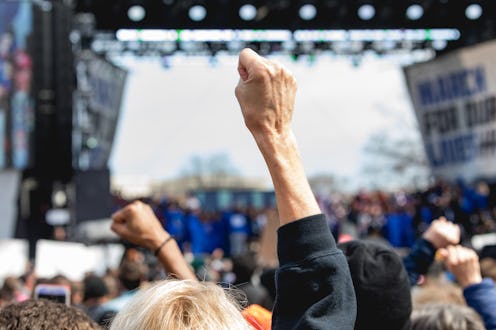
Matthew Hogenmiller turned 18 last week. The high school senior, from Austin, Texas, is learning remotely—like nearly 54 million of his peers—and reconciling the cancellation of prom and, likely, his upcoming graduation. Outside of school, Hogenmiller moonlights as a social media strategist for March For Our Lives, the youth-led gun control advocacy group, which started after the 2018 shooting at Marjory Stoneman Douglas High School. Alongside a tiny team, he oversees online strategy for nearly 300 chapters nationwide.
Virtual organizing is the status quo for March For Our Lives, which has always operated primarily online. Other grassroots groups are similarly creating digital-first activities, like Swing Left, which hosts virtual letter-writing parties. The progressive organization says it sends about 50,000 letters a week to swing state voters.
Bustle talked with Hogenmiller and Alexis Confer, the new executive director of March For Our Lives, about coalition building, organizing tactics, and their new voter-turnout campaign, Our Power.
How has your structure shifted in the last two weeks?
Hogenmiller: We're no stranger to Zoom calls — I've been on [them] five hours a day — but we’ve adapted our calls in some ways. Now we make sure everyone's on video so we make face-to-face contact. At the beginning of calls, we talk about our highs and lows, to keep track of our mental health.
How has the coronavirus changed your conversations?
Confer: Obviously we have professional tasks that need to get done, but we're also a community. [We’re] intentional about creating spaces so people feel like they can talk. Openly dialoguing is key.
Hogenmiller: People are genuinely affected by gun violence, and they're also affected by COVID-19. When people are stuck in their homes, statistically there are more suicides. How can we combat this with new methods that our followers will enjoy?
Matthew, how do you balance that with high school?
Hogenmiller: My school is closed, so we've been doing distance learning. I do conferences with my classmates. My teachers asked me how to run the calls.
What’s transitioning particularly well to the digital space?
Hogenmiller: People are in front of their phones, they're bored at home, and they're trying to find joy in an otherwise dark world with COVID-19. We worked with designers [to] create GIFS, which are performing well. People know that advocacy and activism isn't stopping for COVID-19. That's one of the messages we're pushing.
When you're on a big conference call, what strategies do you use to make it successful?
Confer: Still having the agenda, keeping ourselves organized, and asking who's leading the call.
Hogenmiller: Know who you’re directing [a question] to. On these conference calls, when somebody has a question, they're not asking everybody.
For people organizing in their communities, do you have tactics you recommend?
Hogenmiller: Asking people to help further your movement through art. Designers want to help. I would encourage people to share art and share their stories.
Do you have any apps you'd recommend to other organizers?
Confer: Zoom is our go-to. It makes you feel connected because you can see people’s faces. We use Slack. It's on all of our phones and computers.
Hogenmiller: I've been FaceTiming people. It’s exciting to see their pets.
I'm a Zoom newbie. Any recommendations for best practices?
Hogenmiller: Keep your camera on, and mute when you're not talking. Our national organizing director [uses] breakout sessions. If we need to have separate conversations about the same overarching topic, he can click a button that breaks people out into different rooms within one Zoom call. That way they can talk one-on-one. It’s really helpful.
With Our Power, you’re hoping to engage potential voters and increase voter turnout. Why are young people key to this?
Hogenmiller: For my [high school] classes, I call in for 10 minutes to check in, and then do my own work. We have a lot of time on our hands. People are excited to get to work, because they're stuck at home and bored. They want to create change with us.
Confer: Our Power, if we do this right, is creating a platform where people feel like they’re being heard. So, gun violence, climate, immigration reform. We hope the candidates for president and elected office will take them seriously. This is urgent for us. There's no sitting around for someone to come save young people. Young people are here to save themselves. They're pissed. They're motivated. They're organized. They’re reading every bit of information they possibly can. People should be hopeful, but a bit afraid. They’re ready to act.
This interview has been edited and condensed for clarity.